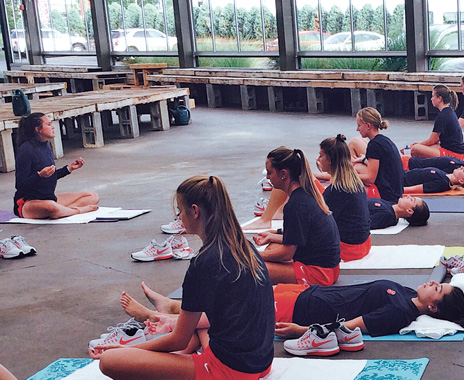Fast casuals have embraced the healthy lifestyle image since the dawn of the industry, so perhaps it shouldn’t come as a surprise that yoga has become a popular way for fast-casual operators to connect with their audience.
Restaurants across the U.S. are mixing yoga and food via everything from offering in-house yoga classes to hosting full-blown yoga festivals.
Consider that roughly 36 million Americans now practice some form of yoga versus 20.4 million just four years ago, according to a 2016 joint poll conducted by Yoga Alliance and Yoga Journal. Even more impressive, spending on yoga paraphernalia—from clothing to equipment to classes—stretched to $16 billion in 2016, versus $10 billion in 2012, the study found.
But here’s the clincher: Those who practice yoga are also much more likely to be “focused on sustainable living and eating,” says Barbara Dobberthien, executive director of the Yoga Alliance.
For small restaurant operators—particularly in college towns or in well-to-do cities with lots of highly educated, Millennial women—it doesn’t take a guru to see that cozying up with yoga could be profitable.
Enter Todd Mansfield. While he’s not exactly a yoga devotee, he is a guy with a doctorate in physical therapy and nutrition. Until two years ago, Mansfield had no connection to the restaurant industry, but he was seriously stumped over why one-third of American children are obese and 60 percent of adults are overweight or obese. “I wanted to know why Americans are so sick,” he says.
The answer? It’s all about how we treat our bodies—inside and out. That’s why, two years ago, he and his business partners cofounded Binghamton, New York–based CoreLife Eatery, a fast-casual restaurant chain dedicated to selling “clean” food and telling the food’s full story. And before the restaurant opened its first location in Syracuse, Mansfield decided to directly market his new restaurant to what he thought could be its core demographic: yoga lovers.
Mansfield went online and paged through phone books, seeking out every yoga studio, instructor, and equipment seller in the Syracuse area. He invited every one of them to the restaurant’s “soft opening” party so they could taste the food.
They came. They ate. And they came back. “The majority of them said, ‘This is exactly what we’ve been looking for,’” Mansfield says. “All they wanted was a place where they could feed themselves whole, clean, healthy food that’s nutrient dense.”
The food also is GMO-free, free-range, and grass-fed. “Our restaurant is about cleaning up your life and returning to basics,” Mansfield says. “That’s the story of most yoga people, too.”
The yoga involvement at CoreLife has significantly grown. It began last summer with a single yoga class hosted by a local instructor at the restaurant early on a Saturday morning. “People stayed after the class and ate,” Mansfield says.
Then the restaurant started mixing it up. It hosted a Yoga Pilates class. When the leadership team realized they needed more space for their yoga fans, they hosted a yoga event at a large greenhouse nearby. More than 200 people showed up.
“If you had said one year ago that I’d be talking about yoga in an authentic way, I’d have said, ‘no way,’” Mansfield says. “I don’t think you can overstate the impact that being connected with yoga has had on the success of our business.”
Desi Springer totally gets that. Eighteen years ago, the Denver resident opened a yoga studio, Vital Yoga (now called Vital Center for Mind-Body Health) with her sister. More recently, just five doors down, Springer became a co-owner of Vital Root, a fast-casual vegetarian restaurant that sources its food locally.
“Both are called ‘vital’ because they share the same philosophy of health and nutrition,” Springer says.
She opened the restaurant, in part, she says, because when people aren’t eating well, they can’t enjoy the full benefits from the yoga and her other body movement classes dubbed “Bowspring.”
Because so many of her students now frequent her restaurant after class, she says, “They joke that they no longer remember how to grocery shop.”
At CoreLife, by Mansfield’s own estimates, about 10 percent of customers have a yoga connection. That may sound small, but, he adds, it’s still significant. “If I could pick one group of major influencers who have done the most for our business, it would be yoga.”
Perhaps that’s why, more recently, Syracuse University even got into the CoreLife Eatery mix, when a college sorority hosted a yoga-related fundraiser dubbed “Yoga Feast.” The all-day event had a half-dozen instructors and vendors, including athletic-ware company Lululemon.
The CoreLife Eatery store that recently opened in Webster, New York, sponsored something called “Yoga Hikes.” At the end of the hike, there was organic lemonade and salads awaiting tired participants. And its Rochester, New York, location will even sponsor a marathon with a yoga connection.
“The healthy mind, body, and spirit that yoga stands for is the same as healthy food,” Mansfield says. “So we’ve tried to blend the two together.”
Nationally, CoreLife plans to open five more locations this year and 15 in 2017. “Our focus on the yoga market is central to our whole message,” he says.










